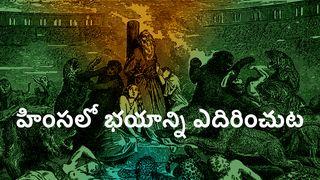Choosing to Trust God in Every Season: Lessons From Noahనమూనా

A Divine Appointment
When the ark was at last complete, Noah heard from God again.
When Noah was 600 years old, the preparations are done, and God revealed that His judgment was imminent; it was time for Noah’s rescue. But first, God tells Noah what He has observed.
…I have seen that you are righteous before me in this generation. Genesis 7:1
God was not describing a vague spiritual feeling that He observed, or someone who kept rituals. He was identifying a man whose singular life stood out in a world gone dark. The word righteous speaks of right standing with God, but in Noah’s case, it also meant faithful obedience and public integrity. In the middle of corruption, he didn’t conform—he reflected God’s character.
Noah lived among people whose thoughts were “only evil continually,” yet he walked with God faithfully. That walk was not silent or hidden. His life was so marked by his faith that it had a powerful effect.
READ
Hebrews 11:7By faith Noah, when warned about things not yet seen, in holy fear built an ark to save his family. By his faith he condemned the world and became heir of the righteousness that is in keeping with faith.
2 Peter 2:5[God] did not spare the ancient world when he brought the flood on its ungodly people, but protected Noah, a preacher of righteousness, and seven others...
Noah did not shrink back from his calling.
His very life—his construction of the ark, his day-by-day obedience, his refusal to participate in evil—testified to the reality of a holy God. He was not just different. He was faithfully present, a witness to God in both word and deed. He certainly could have turned inward and focused only on his own life and the challenges he was facing - obsessing about his troubles. But walking with God gave him God's heart for the world and kept him from being self-absorbed. God placed Noah in that generation, at that moment in history, for a reason – and Noah embraced his purpose.
God’s work is never random. As Noah was appointed to his generation to know God and make Him known, we are also intentionally appointed.
READ
Acts 17:26–27 From one man he made all the nations, that they should inhabit the whole earth; and he marked out their appointed times in history and the boundaries of their lands. God did this so that they would seek him and perhaps reach out for him and find him, though he is not far from any one of us.
2 Timothy 1:9 He has saved us and called us to a holy life—not because of anything we have done but because of his own purpose and grace.
Ezekiel 33:6 "If the watchman sees the sword coming and does not blow the trumpet… I will hold that watchman accountable."
REFLECT
What does it mean to be a “preacher of righteousness” “in your generation?” Why do you think God appoints those who follow Him to carry the responsibility to make Him known in their time? What does it demonstrate about a person’s faith who publicly shares what they know about God?Where has God placed you to reflect His truth in a culture that may resist it? What fears cause you to shrink back from being His witness in your appointed time? How does Noah’s witness help you see the significance of your role in your generation? What do you learn from his willingness to be a witness for God even in a hard season in his own life? How can that be a blessing?
They were watching.
As Noah entered the ark at God’s command, it was not the first day the world had seen him obey. His entire life was a visible, long-term witness. Decades of preparation and preaching. Decades of trusting God’s word about something never seen before. Noah preached with more than words. His obedience was loud. His life was an invitation to take God seriously.
And still, no one listened. That should sober us—but also clarify our role.
1 Corinthians 3:6–7 “I planted the seed, Apollos watered it, but God has been making it grow. So neither the one who plants nor the one who waters is anything, but only God, who makes things grow.”
Our job is not to convince everyone. It is to be faithful witnesses.
God is not calling us to results, because those are His alone. Noah warned through word and deed. He built what no one had seen, warned about what no one believed, and honored a God no one else feared. He lived in such a way that even the disobedient had no excuse. The very nature of his righteousness was perhaps his loudest witness.
But being righteous does not mean being holier-than-thou. It means being a reliable reflection of God’s character—truthful, compassionate, faithful, and bold. It’s not about superiority. It’s about sincerity and consistency as an image bearer of God.
Our righteousness, like Noah’s, should extend beyond feeling grief or pity for the lost. If we don’t speak, if we don't live lives that clearly point to truth, how will anyone know what’s coming—or Who can save them?
Faithful witnessing is not comfortable. Noah’s obedience came at a cost: isolation, ridicule, decades of waiting. And yet, he did not waver. Why?
He knew faithful witnessing was a bridge to God's promise of a purposeful life.
His witness was authentic because he believed God—and because he loved people enough to warn them. He did not know when God would carry out the flood of judgment, but his job was not to predict timelines or provoke fear. He was called, as we are, to point clearly to the only One who saves.
READ
Romans 10:14“How can they believe in the one of whom they have not heard? And how can they hear without someone preaching to them?”2 Corinthians 5:20“We are therefore Christ’s ambassadors, as though God were making his appeal through us. We implore you on Christ’s behalf: Be reconciled to God.”
REFLECT
What are ways Noah’s faith served as both invitation and indictment to his generation? Why is it important to understand that results from witnessing are not produced by the witness?How can walking more closely with God make you a bolder and more compassionate “preacher of righteousness” in intentional and public ways?
God's Right
When the time came, Noah and his family entered the ark.
They and all the animals God had sent to them two-by-two, male and female, went in through the only door.
And the Lord shut him in.Genesis 7:16
Noah did not close the door. God did. The act is decisive and deeply symbolic. This was the dividing line between mercy received and mercy rejected. Noah was safe, not because of timing or luck, but because he responded in faith to God's invitation.
We feel the weight of that moment. Can you imagine Noah, hearing the rains begin? Did his heart ache for neighbors and extended family who had scoffed at his warnings? Did he feel the burden of those left behind?
There’s real tension here—a tension we’re meant to feel.
Judgment is uncomfortable. The flood was not just a natural disaster—it was the expression of divine justice. It is right to feel grieved by the magnitude of the destruction. To mourn for the lives lost. To feel a deep ache over a world that would not listen. That ache reflects the heart of God. He takes no delight when the rebellious perish.
Ezekiel 18:23 “Do I take any pleasure in the death of the wicked?”declares the Sovereign Lord.“Rather, am I not pleased when they turn from their ways and live?”
To feel sorrow over their judgment is to feel something of what God feels. But God’s justice is not restrained by His compassion. Nor is God’s judgment arbitrary. It is holy, perfect, and fully informed. He is the Creator—which means He knows the depth of the heart, the ripple of every sin, the full weight of generational corruption. Remember, “The Lord saw that every inclination of the thoughts of the human heart was only evil all the time” (Genesis 6:5). That’s not exaggeration—it’s divine x-ray vision.
Only God is qualified to judge.
- He made us, having “formed us from the dust of the ground.” He alone knows what we were designed for. (Genesis 2:7)
- He sees all things. “Nothing in all creation is hidden from God’s sight. Everything is uncovered and laid bare before the eyes of him to whom we must give account.” (Hebrews 4:13)
- He defines justice and righteousness—not by comparison, but by His own holy nature. “He is the Rock, his works are perfect, and all his ways are just. A faithful God who does no wrong, upright and just is he.” (Deuteronomy 32:4)
We are all under a death penalty.
Since Eden, every human has been born under the curse of sin. That means that while we shrink back from the idea of God taking life in judgement, the truth is the death penalty already looms over all.“In Adam all die” (1 Corinthians 15:22). This is the consequence of man’s rebellion against God, first in the Garden and then replicated by the will in every human heart. So, the question is not whether death will come—but how?
Will death come as a door to God's judgement or a door to God's welcome?
God, in His patience, gives people time to repent. Noah’s generation had decades to heed God’s witness and turn to Him. God is no less patient in our generation.
READ
2 Peter 3:9–10 The Lord is not slow in keeping his promise, as some understand slowness. Instead he is patient with you... But the day of the Lord will come like a thief.
Romans 2:4–5 Or do you show contempt for the riches of his kindness, forbearance and patience, not realizing that God’s kindness is intended to lead you to repentance? But because of your stubbornness and your unrepentant heart, you are storing up wrath against yourself for the day of God’s wrath...
Romans 6:23 For the wages of sin is death, but the free gift of God is eternal life in Christ Jesus our Lord.
REFLECT
How does understanding both God’s sorrow and His sovereignty shape your view of judgment? How has your view of God’s heart toward the lost been impacted by today’s study? What do you think it means that God's kindness leads to repentance? In what ways?How does it comfort or challenge you to know that God alone determines when mercy ends and judgment begins? Are there areas of your life where you treat God's patience as permission to delay repentance? Have you responded to the kindness of God with repentance by accepting his free gift in Jesus?
God's Wait
It is truly shocking.
Not that God acted, but that He waited to act.
It is not His judgment that should astound us, but His patience in the face of wickedness and evil. But when His patience is exhausted, He has every right to say, “Enough.”That’s what the flood was. Not divine rage, but divine justice finally released after long-suffering mercy.
After Noah waited seven long days behind the door God closed, the flood finally begins. The rain falls. The waters from deep within the earth rise until the whole planet is covered. Every living thing outside the ark is wiped away.
This is not just destruction—it’s de-creation.
The language mirrors Genesis 1: animals “after their kind,” “breath of life,” “male and female.” God, who once brought form and fullness, now allows disorder and death. Let’s not rush past this. This was the loss of nearly all human and animal life. It is total. And it is personal to God.
Genesis 6:6 reveals, “The Lord regretted that he had made human beings on the earth, and his heart was deeply troubled.”
We must not imagine God executing judgment with cold distance. The Bible uses human language to help us understand divine grief. God is not like us, but He reveals enough of Himself for us to grasp that sin matters. It wounds. It offends. It breaks the heart of the One who created us. Understanding this helps us grasp the personal magnitude of His decision to de-create the world He once called “good.” And only in knowing with certainty that God is good, could Noah continue to trust God in the face of what was beyond human comprehension.
Before we move on, let’s revisit Jesus' warning.
Luke 17:26–27 “Just as it was in the days of Noah, so also will it be in the days of the Son of Man. People were eating, drinking, marrying and being given in marriage up to the day Noah entered the ark. Then the flood came and destroyed them all.”
If God placed Noah in his generation to warn a dying world that judgment was coming, what makes us think we’re not called to do the same in ours?
- The world is broken—but we are called to build.
- The world is resistant—but we are called to warn.
- The world mocks—but we live by faith, not by applause.
- God will judge - in a day and hour no one knows.
We are not just here to survive the culture, or escape from it —we are here to shine in it. To warn. To witness. To love a lost world. To reflect a God who still saves. To be Noahs in our generation.
READ
Matthew 5:16 “Let your light shine before others, that they may see your good deeds and glorify your Father in heaven.”
2 Corinthians 5:20 We are therefore Christ’s ambassadors, as though God were making his appeal through us. We implore you on Christ’s behalf: Be reconciled to God.
1 Peter 3:15 But in your hearts revere Christ as Lord. Always be prepared to give an answer to everyone who asks you to give the reason for the hope that you have. But do this with gentleness and respect.
REFLECT
How can you prepare today to give a reason for your hope tomorrow?How will you show you trust God by accepting the call to be His witness even in your current season?
We are not responsible for the results of accepting our calling to be witnesses. We are only responsible for our faithfulness.
వాక్యము
ఈ ప్రణాళిక గురించి

Do you ever feel like God is asking you to trust Him without showing you the full plan? You’re not alone! If Noah’s story hits close to home, this Bible study is for you. It’s designed to encourage you to boldly obey even when the future feels unclear.
More







